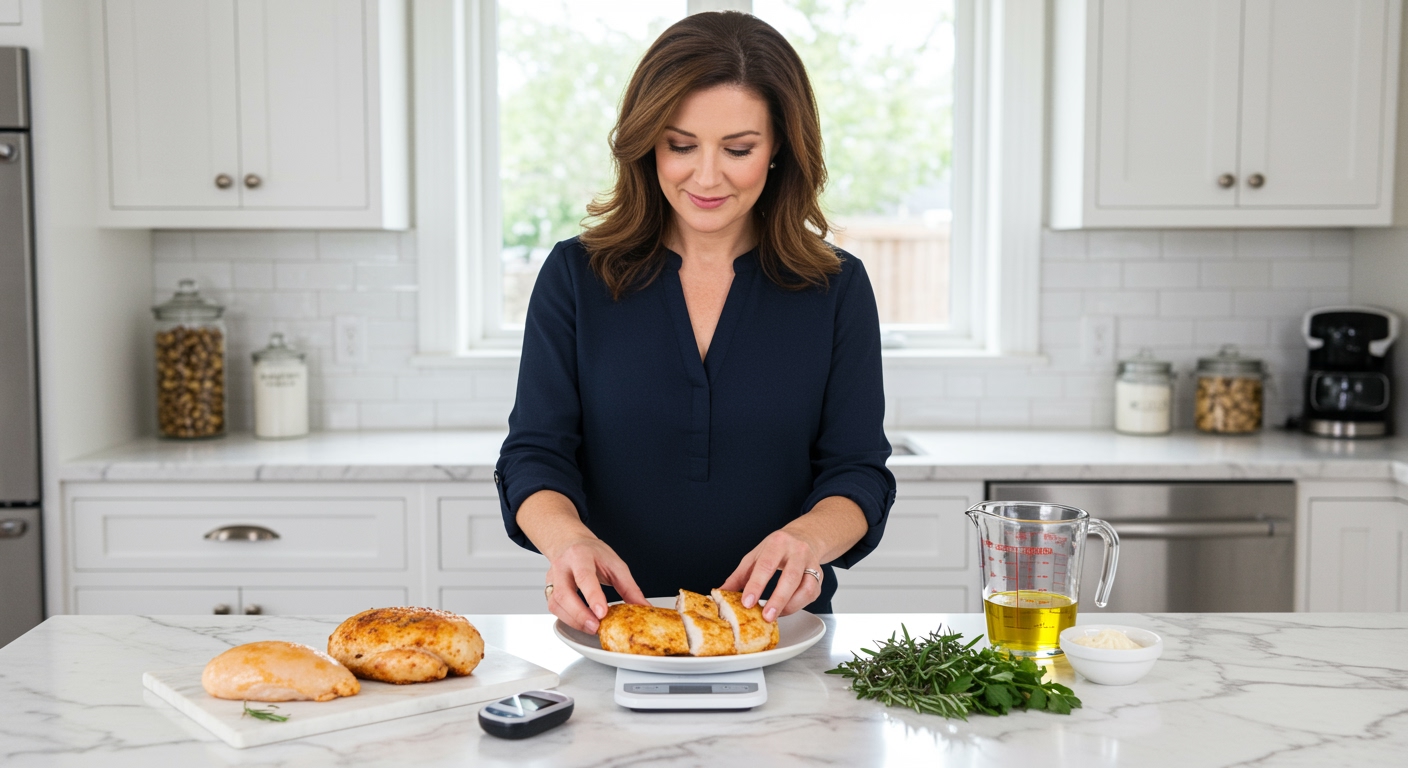✪ Key Takeaway: Baked chicken is excellent for diabetes as it contains zero carbs and helps stabilize blood sugar levels.
Introduction
Your doctor just told you that you have diabetes, and now every food choice feels like walking through a minefield.
You might be wondering if your favorite baked chicken dinner is still safe to eat, or if it will send your blood sugar levels soaring like a rocket.
Hi, I’m Abdur, your nutrition coach, and today I’m going to explain exactly how baked chicken affects your blood sugar and why it might become your new best friend in diabetes management.
Does Baked Chicken Raise Blood Sugar?
Baked chicken has a glycemic index of zero, which means it does not raise your blood sugar levels at all.
This happens because chicken contains no carbohydrates, and only carbohydrates directly impact your blood glucose levels.
When you eat baked chicken, your body breaks down the protein into amino acids through a process called protein synthesis.
These amino acids get used for muscle repair, hormone production, and other essential body functions rather than being converted to glucose.
The absence of carbs in chicken means your pancreas does not need to release insulin to process this food.
This makes baked chicken one of the safest protein choices for people managing diabetes or prediabetes.
✪ Fact: A 3-ounce serving of baked chicken breast contains 26 grams of protein and zero grams of carbohydrates.
How Much Baked Chicken Can You Eat With Diabetes?
Most people with diabetes can safely eat 3 to 4 ounces of baked chicken per meal without any blood sugar concerns.
This portion size equals about the size of your palm or a deck of playing cards.
Your body can efficiently process this amount of high-quality protein without putting stress on your metabolic system.
However, eating massive portions of any food, including chicken, can trigger a mild insulin response through a process called the incretin effect.
This happens when your stomach stretches significantly, sending signals to your pancreas to prepare for nutrient absorption.
Sticking to reasonable portions helps you avoid this unnecessary metabolic stress while still getting all the nutritional benefits chicken offers.
✪ Pro Tip: Use a kitchen scale to measure chicken portions until you can eyeball the correct serving size accurately.
What Makes Baked Chicken Better Than Other Cooking Methods?
Baking chicken preserves all the natural nutrients without adding unnecessary fats, oils, or carbohydrates that other cooking methods require.
When you fry chicken, you add flour coating and oil, which can contain 15 to 20 grams of carbs per serving.
These extra carbs will definitely spike your blood sugar levels and make diabetes management much more difficult.
Baked chicken also retains more moisture and flavor compared to grilled chicken, which can become dry and require sugary sauces.
The gentle heat from baking breaks down the protein fibers slowly, making the chicken easier to digest and absorb.
This improved digestibility means your body can use the amino acids more efficiently for blood sugar regulation and overall health.
✪ Note: Season baked chicken with herbs and spices instead of sugary marinades to keep carbs at zero.
Can Baked Chicken Help Control Blood Sugar?
Baked chicken can actually help stabilize your blood sugar levels when eaten as part of a balanced meal.
The high protein content slows down the digestion of any carbohydrates you eat alongside the chicken.
This happens because protein triggers the release of hormones like GLP-1, which tells your stomach to empty more slowly.
When your stomach empties slowly, the glucose from carbs enters your bloodstream gradually instead of all at once.
This creates a gentler, more manageable rise in blood sugar rather than a dangerous spike.
Many of my clients discover that adding baked chicken to their meals helps them maintain steady energy levels throughout the day without the usual blood sugar rollercoaster.
✪ Pro Tip: Eat baked chicken with non-starchy vegetables to create the perfect diabetes-friendly meal combination.
What Should You Avoid When Eating Baked Chicken?
The biggest mistake people make is covering their baked chicken with high-carb sauces like barbecue sauce, honey mustard, or sweet and sour sauce.
These sauces can contain 8 to 15 grams of sugar per tablespoon, which will definitely raise your blood glucose levels.
Another common error is eating baked chicken with large portions of starchy sides like mashed potatoes, rice, or dinner rolls.
These combinations can overwhelm your body’s ability to process glucose effectively, even with the blood sugar benefits of chicken protein.
Some people also make the mistake of eating chicken skin, which adds unnecessary saturated fat without providing additional protein benefits.
While chicken skin won’t raise blood sugar, it can contribute to insulin resistance over time if consumed regularly in large amounts.
✪ Note: Choose sugar-free seasonings and pair chicken with leafy greens for optimal blood sugar control.
The Bottom Line
Baked chicken is not just safe for diabetes management – it’s actually one of the best protein choices you can make for stable blood sugar control.
Smart food choices create lasting health changes, not temporary fixes, and baked chicken proves that eating well with diabetes doesn’t mean sacrificing flavor or satisfaction.
I’d love to hear about your experience with baked chicken and diabetes management, so please share your questions, success stories, or favorite recipes in the comments below.
References
At NutritionCrown, we use quality and credible sources to ensure our content is accurate and trustworthy. Below are the sources referenced in creating this article:
- FoodStruct: Chicken Meat Glycemic Index
- Use Nourish: Is Chicken Good for Diabetes
- Fitterfly: Is Chicken Good for Diabetes
- Breathe Well-being: How Chicken is Good for Diabetes





